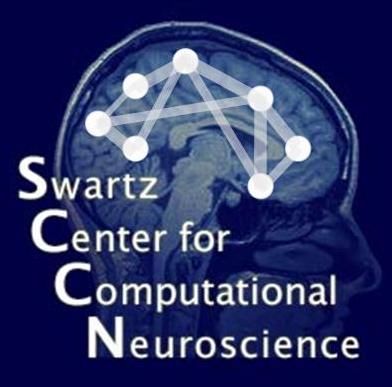
SCCN Home
FMRLAB Home
Download and Install FMRLAB
- Download the following compressed files and save them in the same folder/directory (e.g., ~/matlab/fmrlab):
- Download FSL
- Uncompress the downloaded FMRLAB files.
% tar xvfz *.tgz- Download sample fMRI data set for tutorial and save it in another folder/directory (e.g., ~/fmri_data)
- Compressed file (fmri_sample.tgz).
- Uncompressed files ( 2dseq_r1, 2dseq_str).
- Uncompress the tutorial data files
% tar xvfz *.tgz- Add FMRLAB path to Matlab environment.
To add FMRLAB path in Matlab, you can either:
- Add absolute path where you installed FMRLAB to "~/matlab/startup.m" file.
For example, open ~/matlab/startup.m file, add "path('/home/xxxx/matlab/fmrlab',path);" in the file you just opened.
Or,- Launch Matlab, and type
>> addpath('/home/xxxx/matlab/fmrlab'); everytime you want to start FMRLAB.- Set FMRLAB variables.
- Edit fmrlab_icadefs.m file with any editor available. This file can be found under FMRLAB home directory.
- Find variable ICADIR, change its content to the directory FMRLAB installed (say, "/home/xxxx/matlab/fmrlab/").
- Find variable ICABINARY, change its content to "/home/xxxx/matlab/fmrlab/ica_linux".
- Find variable SC, change its content to "/home/xxxx/matlab/fmrlab/binica.sc".
- Be sure to make changes according to your environment properly.
- Link FMRLAB to FSL spatial normalization program.
- If you downloaded and install the entire FSL package: (learn how to install here)
- Edit fmrlab_icadefs.m file with any editor available. This file can be found under FMRLAB home directory.
- Find variable FSLDIR, change its content to the directory FSL package is installed.
- If you only downloaded the spatial normalization routine:
- Make bin/ subdirectory under FMRLAB home directory.
- Copy the downloaded file, flirt_linux or flirt_mac to the bin/ directory just created, and rename it to flirt.
- Edit fmrlab_icadefs.m file with any editor available. This file can be found under FMRLAB home directory.
- Find variable FSLDIR, change its content to the FMRLAB home directory.
- Now, you are ready to explore the FMRLAB.
Questions or comments to this page, please send e-meil to: fmrlab@sccn.ucsd.edu.